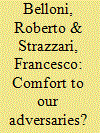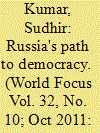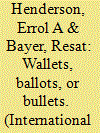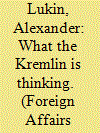|
|
|
Sort Order |
|
|
|
Items / Page
|
|
|
|
|
|
|
| Srl | Item |
| 1 |
ID:
133431


|
|
|
|
|
| Publication |
2014.
|
| Summary/Abstract |
Since the late 1990s international state builders have paid increasing attention to fighting corruption in both Bosnia-Herzegovina and Kosovo. On the surface this effort has brought significant results, since both countries have adopted legal frameworks modelled on the best practices of Western democracies. In practice, however, corruption remains rampant. This disappointing outcome has several explanations: in reviewing the empirical evidence we consider the two countries as cases involving heavily assisted transition from both socialism and war, highlighting how collusive practices between political and criminal interests have played a role in establishing formally liberal but substantively 'hybrid' institutions. We argue that the spread of corruption has been implicitly legitimised by international actors, who have pressured local parties to accept the formal architecture of good governance, including anti-corruption legislation, while turning a blind eye to those extra-legal structures and practices perceived as functional to political stability.
|
|
|
|
|
|
|
|
|
|
|
|
|
|
|
|
| 2 |
ID:
108196


|
|
|
| 3 |
ID:
161421


|
|
|
| 4 |
ID:
120872


|
|
|
|
|
| Publication |
2013.
|
| Summary/Abstract |
We examine the extent to which wealth, democracy, and/or relative military capabilities contribute to victory in interstate war. Examining contingency tables, we find that states with greater military capabilities are more likely to win their wars whether they are wealthier or democratic, and democratic states perform marginally better than wealthier states in war. Probit analyses indicate that although each of the variables has a robust and positive impact on war victory, relative capabilities has the strongest substantive impact, followed by wealth, then democracy. Hazard analyses reveal that states with greater military capabilities fight shorter wars than either democracies or wealthier states, and controlling for capabilities and wealth, the relationship between democracy and war duration is not significant, which challenges the view that democracies have a unique propensity to fight shorter wars. We also find that the democratic victory phenomenon is not universal, but is contingent on the placement of a single country, Israel, in the Western or non-Western democracy category. In sum, our analyses indicate that although each of the three factors contributes to war victory, relative military capability is the most powerful, consistent, and robust predictor to victory in interstate war.
|
|
|
|
|
|
|
|
|
|
|
|
|
|
|
|
| 5 |
ID:
132134


|
|
|
|
|
| Publication |
2014.
|
| Summary/Abstract |
Soon after the Soviet Union's collapse in 1991, Western leaders began to think of Russia as a partner. Although Washington and its friends in Europe never considered Moscow a true ally, they assumed that Russia shared their basic domestic and foreign policy goals and would gradually come to embrace Western-style democracy at home and liberal norms abroad. That road would be bumpy, of course. But Washington and Brussels attributed Moscow's distinctive politics to Russia's national peculiarities and lack of experience with democracy. And they blamed the disagreements that arose over the former Yugoslavia, Iraq, and Iran on the short time Russia had spent under Western influence. This line of reasoning characterized what could be termed the West's post-Soviet consensus view of Russia.
|
|
|
|
|
|
|
|
|
|
|
|
|
|
|
|
|
|
|
|
|